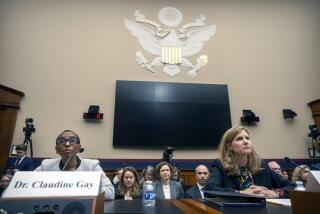Community Essay : War on Prejudice Starts With Ourselves : Many of our negative views of others were unwittingly formed in childhood. A willingness to rethink old ideas can help us change.
- Share via
All of us have prejudices. We might like to believe that we outgrow most of them. Unfortunately, a large number of prejudices begin early in life and linger until we confront and change them.
That is because early life exposure to society’s rejection of select groups is profound. Sadly, the attitudes of fear and loathing are often delivered to us by people we love and depend on. The messages of intolerance and mistrust of others are interwoven with messages of nurturing and affection for us.
When we were children and our care-givers expressed their affection by telling us about threats and promising to protect us from them, that made us feel loved and secure. But if those care-givers didn’t differentiate between “real threats” (people who drive recklessly, push drugs or bully others) and “imagined threats” (people who have a different race, religion or sexual orientation), then we developed fears and dislikes of people who are merely different. Those fears, though irrational, were paired with early memories of love and security--and that makes them powerful and enduring.
As children, we weren’t sophisticated enough to determine which messages were unnecessary for our survival and which reflected the prejudices of our care-givers. Unwittingly, we went along, reinforcing negative ideas about others because we trusted those who gave us those ideas in the first place. Many of us arrive at adulthood with some harmful baggage.
So what can we do about it now?
A lot. First, we can examine the many messages we have received and determine which we want to foster and which we want to change. It is possible to value the loving and nurturing messages we received from care-givers while acknowledging that they grew up with prejudices that may have been inadvertently passed along to us.
Next, we can educate ourselves and confront any false ideas we have about people who are different. The many cultural events in Los Angeles, including festivals, fairs, films and art exhibits, offer a great way to learn something new while having fun. If nothing new is allowed in, we’re stuck with the information that created the prejudices in the first place.
Finally, we can put our learning into action. Do we let derogatory remarks about others pass without comment because we can remember hearing someone from our past say them? Or do we remind ourselves and others that we need to shed some of our old ideas and develop new ones? Do we structure our lives to avoid people who are different from us because “that’s the way it’s always been?” Or do we evaluate our behavior rationally and try to change it?
Examining old attitudes, seeking out information to form new ones and changing behavior--those are the key elements to winning the war on prejudice.
What is the most effective way to do these things on a regular basis? If, in our personal and professional lives, we reach out to meet and interact with people who are different from us, we will be able to confront old attitudes regularly. New friends can help educate us by sharing their life experiences and listening to ours. As the friendships grow, our motivation to change will also grow. And as the number of friendships and acquaintances increases, we will have more examples of people in our lives who reinforce new ideas about others who may be different.


